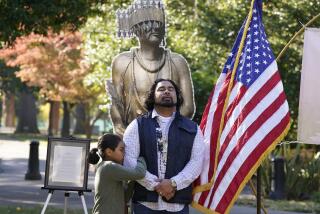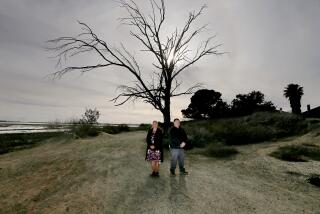Couple Feel Turnabout Is Fair Play : Conservation: Their ancestors bought property from the Indians for a handful of beads. This year, when taxes got too high, they gave it back to the tribe.
- Share via
WESTERLY, R.I. — Arlene Crandall looked out at the lone, gnarled cherry tree that shades the graves of her husband’s ancestors, and her face broke into a mischievous smile.
“I’m sure they would agree with what we did,” she said.
The 66-year-old woman and her 71-year-old husband, Irving, decided in the spring to give back to the Narragansett Indians hundreds of acres of forest and marshland along Route 1. The first Crandalls got the homestead from the tribe in 1659 for a few beads and trinkets.
Crandall, a feisty woman with a weathered brown face and a thicket of white hair, said she and her husband gave up 350 acres, valued at $1.37 million, because they no longer could afford to pay taxes on the land and because of the way the town had treated them through the years.
“The town was always laughing at us,” she said. “After we signed the deed over to (the tribe), we were laughing all the way back to the house.”
Crandall said that she and her husband were afraid that the town would auction off the property for the $11,000 they owe in back taxes for 1990 and 1991, and that the next owners would be developers.
“The Indians are the only people we thought gave a damn about the land,” she said. “And because they got federal protection, nobody, not the town or the state, will be able to do anything now.”
Westerly Town Manager Joseph Pellegrino said that he is pleased that the Crandalls gave the land to the Narragansett, even if it means that the town might lose some revenue. The Narragansett have agreed to pay the Crandalls’ back taxes, but may put the land into a federal trust--a status that would make it tax-exempt in the future.
Pellegrino said that despite any fears the Crandalls might have had about the town’s intentions, “we also want to preserve that land.” He said the marshland and bogs on the Crandall property protect the town’s aquifer.
The written agreement between the Crandalls and the Narragansett allows the couple and any heirs they choose to live on the homestead for life.
John Brown, a tribal council member, said the state’s 2,000 Narragansetts were overwhelmed by the Crandalls’ generosity.
“Believe me, when I was standing there (at town hall) watching all this happen, I thought I was going to have kittens,” said Brown, a burly young man who wears his black hair tied back.
“This whole thing kind of renewed my faith in mankind. It has now come full circle. My people gave this land to the original Crandalls as a gesture of goodwill, and now it has been returned to us in the same spirit.”
Brown said tribal records show that Elder John Crandall got the land from the Narragansett in 1659, and it was regranted to his heirs through a signed deed in 1732 out of gratitude for their friendship and help. He said the good relations between the family and the Narragansett continued through successive generations.
“The Crandalls have been known to be honorable people since long before I was born,” Brown said.
He said that the tribe will honor the agreement with the Crandalls and preserve the land, which lies several miles from the tribal headquarters in Charlestown.
“It is a beautiful piece of property,” he said, looking out over the cedar swamps, forests and cleared pastures. “It shouldn’t be handled by man any more than it already has.”
Brown said the tribe has yet to speak with Westerly town officials about whether they will continue to levy property taxes on the land.
“But we’re not trying to work beyond the town on this,” he said. “We just haven’t come to any decisions yet.”
The Narragansett received about 1,800 acres of their ancient homeland, which once included all of southern Rhode Island and parts of Massachusetts and Connecticut, under federal legislation enacted in 1978. That land, turned over to them in 1985, cannot be taxed by the town of Charlestown. This relatively poor tribe, which has about 350 active members, plans to build a 1,000-seat bingo parlor on its reservation soon. The reservation now includes a tribal office, a church and a center for the elderly, as well as a score of homes.
Crandall said that she and her husband had considered giving their land to the Nature Conservancy or the Rhode Island Audubon group, but in the end thought it would be a better gesture to return it to the Narragansetts.
“We really didn’t have much choice, though,” she said. “They (the town) were upping our taxes all the time, and we hardly had much money, even to eat. The house and barn need work, and my husband is only one man.”
More to Read
Sign up for Essential California
The most important California stories and recommendations in your inbox every morning.
You may occasionally receive promotional content from the Los Angeles Times.










